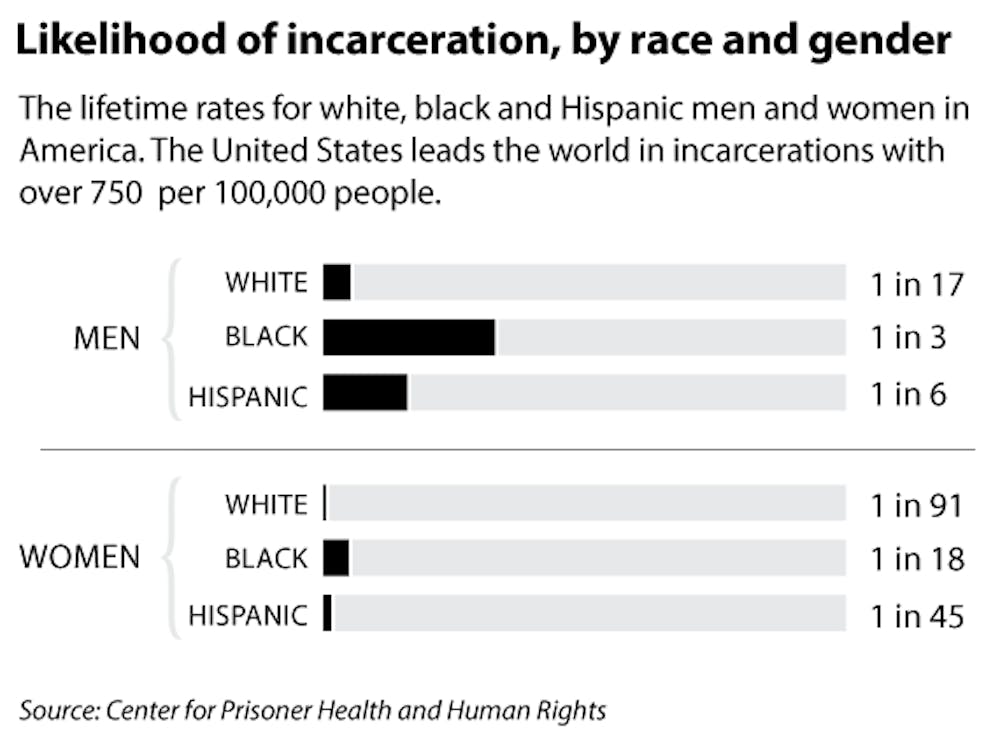Many prisoners do not receive adequate health care upon their release, a problem that was the focal point of an event entitled “Incarceration, Disparities and Health in America in the Age of Health Care Reform” held Friday in the Perry and Marty Granoff Center for the Creative Arts.
The symposium featured presentations on the realities former prisoners face accessing health care, followed by a question-and-answer session with panelists. With an audience of about 70 people, it was the first of a four-part series on prisoner health.
The event began with a presentation by Sol Rodriguez, executive director of the Rhode Island-based nonprofit OpenDoors. OpenDoors focuses on reintroducing former prisoners into the community upon their release, helping them attain housing, health care and employment.
The enactment of the Affordable Care Act has made the process of receiving health care more manageable for formerly incarcerated individuals, but there are still significant obstacles for them, Rodriguez said. Many prisoners who are battling substance abuse and mental health problems are met with resistance when they try to seek treatment outside of prison, she added. Without access to the proper medication they were receiving when incarcerated, many individuals wind up back in jail.
OpenDoors is working with prisoners to give them the best possible preparation for release, Rodriguez said in her presentation.
The benefits of the program to prisoners still surprise her sometimes, Rodriguez said. “It amazes me how much they change, how much more confident they are, how engaged they are with their lives,” she said of the prisoners involved.
Rodriguez’s talk was followed by a presentation by Emily Wang, assistant professor at the Yale School of Medicine and co-founder of the Transitions Clinic Network. The Transitions Clinic is specifically designed for people coming out of the prison system. Its goals are to provide quick access to health care for recently released individuals, bring in employees who have been incarcerated in the past to work with the newly released individuals, and partner with organizations like OpenDoors to make the transition out of prison as easy as possible, she said.
With Medicaid expansion having come into effect Jan. 1, “there isn’t a better time to do (the event),” said Bradley Brockmann ’76, director of the University’s Center for Prisoner Health and Human Rights and organizer of the symposium.
“There hasn’t been any focus that we can see that highlights the fact that simply handing individuals a Medicaid card is not enough,” he said, which is why the symposium was formed. More than 60 percent of the prison populace is substance-dependent or substance-abusing, and 44 percent of federal prisoners have histories of mental health problems, Brockmann said.
“That was really phenomenal to hear so many perspectives that you don’t normally hear,” David Katzevich ’16 said of the event. “People have got to take action, raise it as an issue, and take political action if you can — I have been motivated to, absolutely.”
“It would have been nice to have someone from the political side to represent that point of view, but I think having everyone together on the same page exchanging ideas is a really valuable thing,” Craig Erickson MD’15 said.
Rodriguez told The Herald the main thing she hoped people would take away from the event was knowledge about “all the positive things we’re doing.” She said she also wants people to know that “the system is still not fixed.” Even with increased access to health care, there are still “barriers” that need to be broken, especially in Rhode Island, she said.
The symposium was co-sponsored by the Center for Prisoner Health and Human Rights, the Pembroke Center, the School of Public Health, Brown/Tufts/Lifespan Center for AIDS Research and the Damiano Foundation.
The next installment of the series, focused on substance abuse, will be held Feb. 28.

ADVERTISEMENT




